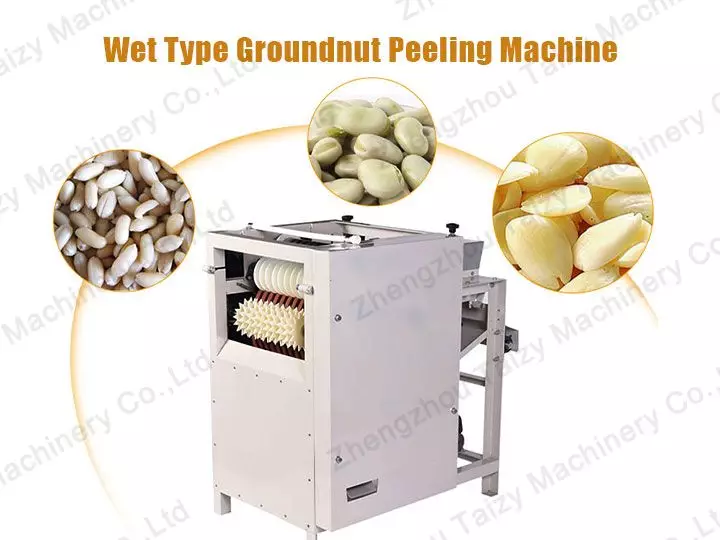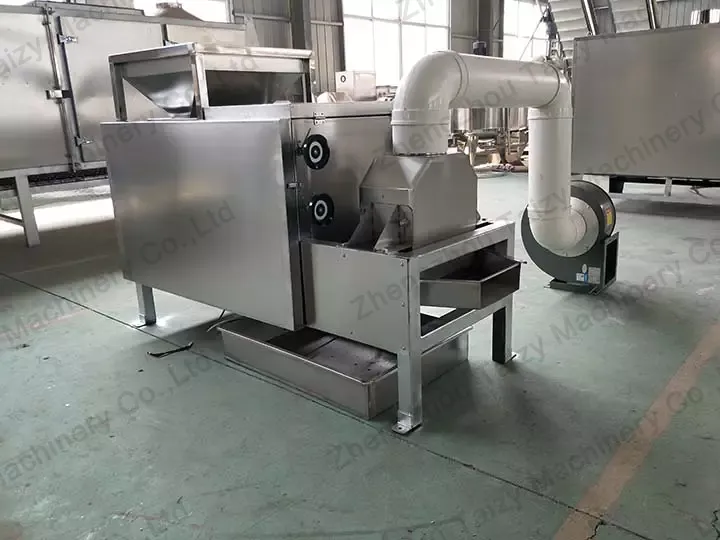Je, ni Aina Gani za Mashine Zinazopatikana kwa Kung'oa Karanga?
Linapokuja suala la kusindika karanga kwa ufanisi, kuwa na vifaa vinavyofaa kunaweza kuleta mabadiliko makubwa katika suala la tija na ubora. Katika makala hii, tutazama katika ulimwengu wa karanga mashine za kumenya, zinazolenga hasa aina mbili maarufu: mashine za aina ya mvua za kumenya njugu na mashine za kumenya karanga za aina kavu. Tutachunguza jinsi mashine hizi zinavyofanya kazi na faida zao husika.
Aina za Mashine ya Kung'oa Karanga
Mashine za Kung'oa Karanga zenye Maji
Aina ya mvua mashine ya kumenya karangas, kama jina linavyopendekeza, tumia maji katika mchakato wa kumenya. Mashine hizi zinafaa kwa kuondoa ngozi ya nje au ganda la karanga huku zikihifadhi uadilifu wa kokwa ndani. Hivi ndivyo mashine ya aina ya mvua ya kumenya kazi ya karanga:

Kanuni ya Kufanya Kazi ya Mashine za Kumenya Nati za Aina ya Mvua
- Kuloweka: Mchakato huanza kwa kuloweka karanga kwenye maji kwa muda maalum, kwa kawaida saa chache. Ulowekaji huu husaidia kulainisha ganda la nje, na kuifanya iwe rahisi kumenya.
- Abrasion: Baada ya kulowekwa, karanga huingizwa kwenye mashine, ambapo hugusana na nyuso za abrasive. Nyuso hizi husugua kwa upole dhidi ya ganda laini, na kusababisha kutengana na nati.
- Jeti za Maji: Wakati huo huo, jeti za maji hutumiwa kuosha maganda yaliyolegea, na kuacha karanga safi, zilizoganda.
Manufaa ya Mashine za Kumenya Nati aina ya Mvua
- Ufanisi wa Juu: Mashine za njia ya unyevu zinaweza kusindika kiasi kikubwa cha karanga kwa muda mfupi, na kuzifanya zifae kwa matumizi ya kibiashara.
- Ubora Thabiti: Mashine hizi zinajulikana kwa kuzalisha karanga sare, zilizoganda vizuri na kuharibika kidogo kwa karanga.
- Kazi Iliyopunguzwa: Otomatiki katika mchakato wa kumenya hupunguza hitaji la kazi ya mikono, kuokoa wakati na rasilimali.
Mashine za Kumenya Karanga Aina Kavu
Mashine ya aina kavu ya kumenya njugu, kwa upande mwingine, usitegemee maji wakati wa kumenya. Badala yake, hutumia njia za kiufundi kuondoa ganda la nje la karanga zilizochomwa. Hivi ndivyo njia kavu ya mashine ya kumenya karanga hufanya kazi:
Kanuni ya Kufanya Kazi ya Mashine za Kumenya Nati za Aina Kavu
- Msuguano na Athari: Mashine za njia kavu hutumia mchanganyiko wa msuguano na athari ili kuondoa ganda la nje. Karanga hulishwa ndani ya mashine, ambapo hugusana na rollers zinazozunguka au nyuso za abrasive. Karanga zinaposonga kwenye mashine, msuguano na athari husababisha ganda kupasuka na kujitenga na kokwa.
- Utengano wa Hewa: Mara baada ya makombora kupasuka, kipulizia hewa mara nyingi hutumiwa kutenganisha maganda kutoka kwa karanga. Maganda mepesi yanapeperushwa, na kuacha nyuma ya karanga zilizoganda.

Manufaa ya Mashine ya Kumenya Karanga Aina Kavu
- Uhifadhi wa Maji: Mashine za aina kavu hazihitaji maji kwa ajili ya kumenya, na kuzifanya kuwa rafiki wa mazingira na kuhifadhi rasilimali za maji.
- Uwezo mwingi: Mashine za njia kavu zinaweza kushughulikia aina na saizi tofauti za karanga, na kutoa utofauti katika usindikaji.
- Gharama nafuu: Mashine hizi huwa na gharama nafuu zaidi, kwani huondoa hitaji la maji na mchakato wa kukausha unaohusishwa.
Kwa hivyo, chaguo kati ya aina ya mvua na aina kavu ya mashine ya kumenya karanga inategemea mahitaji na mapendeleo yako mahususi. Mashine za njia ya mvua ni bora kwa shughuli za biashara za kiwango cha juu, wakati mashine za njia kavu hutoa faida za kuokoa maji na matumizi mengi.
Ikiwa unatafuta mashine za ubora wa juu za kumenya karanga au vifaa vingine vya kuchakata karanga, zingatia Mashine ya Karanga ya Taizy. Pamoja na anuwai ya mashine za kusindika karanga iliyoundwa kukidhi mahitaji mbalimbali ya uzalishaji, Taizy Mashine ya Karanga ni mshirika wako wa kutegemewa katika ulimwengu wa usindikaji wa karanga. Wasiliana nasi leo ili kuchunguza uteuzi wetu wa kina wa mashine ya karanga na kupeleka usindikaji wako wa karanga kwenye ngazi inayofuata.
